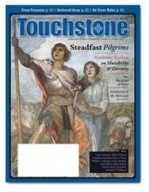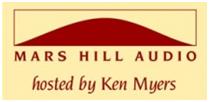Sunday morning idols (2) …

Sunday morning idols don’t always arrive tucked away in the hidden recesses of the human hearts. Sometimes they arrive in software packages ordered by the very people who plan Sunday morning worship.
This specialized worship software promises to “keep track of all sorts of details surrounding the worship experience: musicians’ schedules, whereabouts of media production elements, licensing fees, and so on.” In fact, some of the ad copy for this software promises so much that we’re forced to wonder, “What does God have to do with Sunday worship?”
These are the observations and concerns that Ken Myers, host and producer of MARS HILL AUDIO Journal, wrestles with in a recent article in Touchstone Magazine. Ken alerts us to the ways modern assumptions can be hidden in the technologies used to organize and produce worship services. The result can be a sort of practical atheism.
I use computers (and mobile apps) for all sorts of things, and as a church music director, I have some experience in planning worship services. But the notion that the “production elements” of worship would be so complex (and so driven by technology) as to require specialized software was a bit disturbing. More disturbing still was the display type in the ad, which promised: “Here’s one less thing you’ll have to pray about.” In other words, God need not be bothered concerning the details of worship, since we have such powerful technology. How comforting. How marvelous.
And, Ken concludes, how typically modern!
God does not matter practically—in the practices of everyday life—because the chief end of man in modernity is the maintenance of control over reality, and we can adequately achieve such dominance through science and technology (and through social and cultural institutions that are scientific and technically ordered). …
In such a society, religion is assumed to be helpful for private life, for directing our personal inner worlds. But when it comes to defining how we deal with the external world—in political, economic, commercial, medical, and other social contexts—we can safely set God-talk aside and focus on technique. The issue of God doesn’t enter into the affairs of “real life,” even for people who believe in and enthusiastically worship him (with or without the help of computers).
In “What Has God to do With It?” Ken Myers is not focusing on idolatry as such. Rather, he is presenting a brief review and introduction to Craig Gay’s book, The Way of the (Modern) World: Or, Why It’s Tempting to Live As If God Doesn’t Exist. And he uses an ad for worship software to illustrate the temptation to practical atheism within the Church.
Worldliness is the biblical concept that undergirds the discussion in The Way of the (Modern) World.
Gay’s compelling arguments stand as a challenge to those well-meaning Christian leaders who carelessly embrace allegedly “neutral” cultural forms, ignoring the ways they convey a mentality of godlessness. …
The theological breadth and pastoral passion that he brings to this material is particularly striking. I found most helpful his framing of the problem of modernity in the biblical language of worldliness, a vocabulary that—despite its prominence in the New Testament—is almost entirely absent in the writings of Christians who address matters of cultural engagement (it is, after all, not a worthy concern for sophisticated cosmopolites).
Gay acknowledges that there have been inadequate formulations about the locus of worldliness, by fundamentalists and social gospellers alike. That is not, however, an adequate reason to abandon concern about being conformed to (Rom. 12:2) or stained by (James 1:27) the world. “What if the essence of ‘the world’—and hence of worldliness—is not personal immorality and/or social injustice as such, but is instead an interpretation of reality that essentially excludes the reality of God from the business of life?”
Or, what if it also excludes the reality of God from the planning and directing of Sunday morning worship?
 Ken Myers is the host and producer of the MARS HILL AUDIO Journal. Formerly an arts editor with National Public Radio, he also served as editor of Eternity, the Evangelical monthly magazine, and This World, the quarterly predecessor to First Things. He is a contributing editor for Touchstone.
Ken Myers is the host and producer of the MARS HILL AUDIO Journal. Formerly an arts editor with National Public Radio, he also served as editor of Eternity, the Evangelical monthly magazine, and This World, the quarterly predecessor to First Things. He is a contributing editor for Touchstone.
For more information on Ken Myers and the MARS HILL AUDIO Journal, go here. Please take time to examine the Journal. The two best places to start are by clicking on “Listen for Free” and “Sample the Journal” in the left column.


 July 3, 2012
July 3, 2012 







Comments are closed.